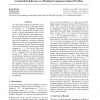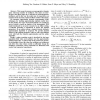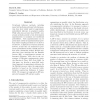509 search results - page 23 / 102 » Using Learning for Approximation in Stochastic Processes |
128
click to vote
ICML
2009
IEEE
15 years 9 months ago
2009
IEEE
One of the main problems in probabilistic grammatical inference consists in inferring a stochastic language, i.e. a probability distribution, in some class of probabilistic models...
140
click to vote
CDC
2010
IEEE
14 years 9 months ago
2010
IEEE
This research concerns a noncooperative dynamic game with large number of oscillators. The states are interpreted as the phase angles for a collection of non-homogeneous oscillator...
120
click to vote
ML
2002
ACM
15 years 2 months ago
2002
ACM
An issue that is critical for the application of Markov decision processes MDPs to realistic problems is how the complexity of planning scales with the size of the MDP. In stochas...
134
click to vote
ICML
2004
IEEE
16 years 3 months ago
2004
IEEE
Variational inference methods, including mean field methods and loopy belief propagation, have been widely used for approximate probabilistic inference in graphical models. While ...
143
Voted
CPAIOR
2008
Springer
15 years 4 months ago
2008
Springer
The one-step anticipatory algorithm (1s-AA) is an online algorithm making decisions under uncertainty by ignoring future non-anticipativity constraints. It makes near-optimal decis...



